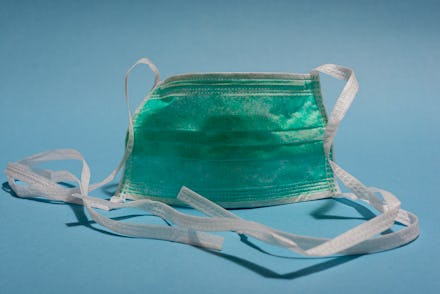Can surgical masks really prevent you from getting sick?

As the outbreak of the new coronavirus that started in China grows — the country’s National Health Commission has so far counted more than 20,000 confirmed cases and 400 deaths — so, too, has the demand for face masks as safeguards against infection. Wuhan, thought to be the origin of the outbreak, as well as other jurisdictions in China, have mandated their use in public spaces. Here in the US, major pharmacy chains, including CVS and Walgreen’s, have seen an uptick in face mask sales. But do surgical masks really do anything to prevent you from getting sick?
Experts told the Washington Post that they won’t completely protect you, and they’re not as effective as tried-and-true methods, like frequent hand washing, to ward off disease. The Centers for Disease Control notes that little is known about how the new coronavirus spreads from person to person, but similar coronaviruses typically get transmitted through respiratory droplets when an infected individual sneezes or coughs.
Still, the CDC doesn’t recommend face masks for the general public, noting that although there has been some person-to-person transmission, the virus isn’t spreading in the US. If you insist on buying a face mask, the CDC has posted guidelines about surgical masks and N95 respirators, often worn by people who are already sick, as well as health care providers, according to TIME. Surgical masks found at pharmacies and online can shield you from splashes or droplets of bodily fluids, but they’re loose-fitting and won’t keep you from breathing in smaller airborne particles.
The CDC recommends N95 respirators for healthcare providers who are treating coronavirus patients. These tight-fitting masks can block at least 95% of airborne particles. While anyone can purchase one, people who aren’t trained in using them (i.e., non-medical professionals) might put them on incorrectly, rendering them ineffective.
Studies have found that if healthcare providers wear face masks, they have a lower risk of spreading disease when treating infected patients. But whether they can protect the general public from disease remains murky. While they can help stop people who are already sick from transmitting germs, especially in certain scenarios — like aboard a crowded, cramped train —they probably won’t curb a coronavirus outbreak, per TIME.
Face masks can create a false sense of security that might you make you drop the ball on proven measures for stopping the spread of disease, like washing your hands often.
It’s also important to think big-picture here: Flooding retailers for N95 face masks may even harm efforts to battle the current outbreak, causing a “negative supply shock” for the healthcare providers who need them way more than we do, Amesh Adalja, a scholar at the Center for Health Security at the Johns Hopkins Bloomberg School of Public Health, told MarketWatch.
Plus, face masks can create a false sense of security that might you make you drop the ball on proven measures for stopping the spread of disease, like washing your hands often with antibacterial soap for at least 20 seconds at a time, Amy Shah, a doctor in allergy and immunology, told the Post. Managing your stress, clocking in enough sleep, and eating dietary sources of vitamin C, like leafy greens, also help. And if you're traveling, she recommends disposable gloves as a protective measure over a regular surgical mask.
Nancy Messonnier, director of the Center for the National Center for Immunization and Respiratory Diseases, advised “being vigilant” to the symptoms of the new coronavirus — a cough and fever — and calling your doctor if you have them, rather than wearing face masks, per MarketWatch.
Face masks might make you feel safe, but given the lack of evidence that they can prevent the new coronavirus, they probably won’t help, and lowering the supply for health care providers may actually do harm.